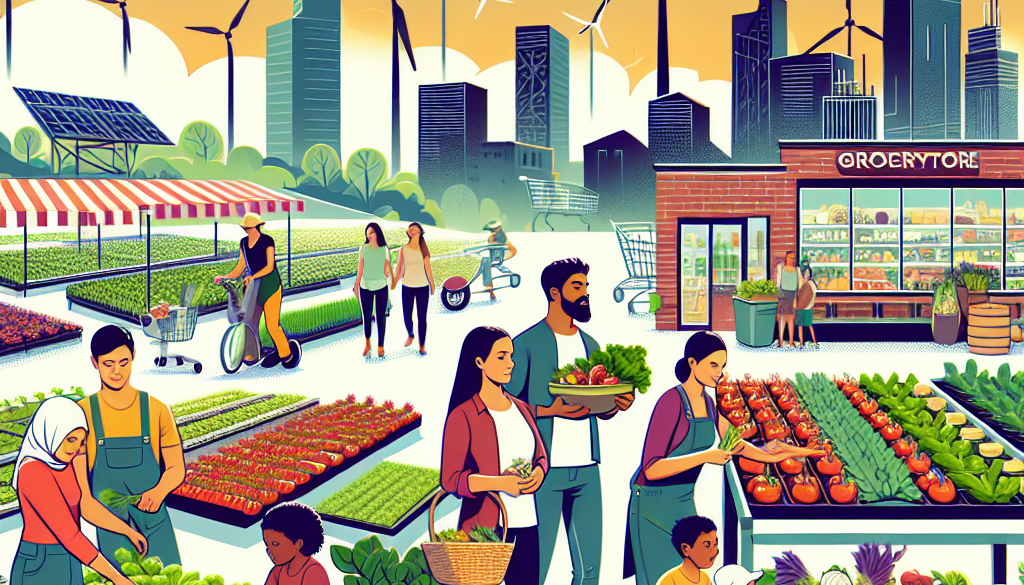Trends Driving Food Sustainability
-
Table of Contents
- Trends Driving Food Sustainability: A Comprehensive Guide
- 1. Plant-Based Diets Gaining Ground
- 2. Regenerative Agriculture Practices
- 3. Technological Innovations in Agriculture
- 4. Reducing Food Waste
- 5. Sustainable Packaging Solutions
- 6. Ethical Sourcing and Fair Trade
- Conclusion
- ETprotein: Sustainable Protein Solutions
Trends Driving Food Sustainability: A Comprehensive Guide

As the global population continues to grow and environmental concerns become more pressing, the need for sustainable food systems has never been greater. Food sustainability involves producing food in ways that are environmentally friendly, economically viable, and socially responsible. This article explores the latest trends driving food sustainability, offering insights into how we can contribute to a healthier planet through our food choices.
1. Plant-Based Diets Gaining Ground
One of the most significant trends in food sustainability is the shift towards plant-based diets. With the livestock industry being a major contributor to greenhouse gas emissions, deforestation, and water consumption, many consumers are turning to plant-based options to reduce their environmental footprint. Statistics show that a plant-based diet can significantly lower carbon emissions compared to a meat-based diet.
- Increased availability of plant-based meat alternatives
- Growth in the variety of plant-based dairy products
- Rising consumer awareness of the health benefits associated with plant-based eating
2. Regenerative Agriculture Practices
Regenerative agriculture is a holistic approach to farming that seeks to restore soil health, increase biodiversity, and improve the water cycle. This method goes beyond sustainable practices by actively improving the ecosystem. Practices such as no-till farming, cover cropping, and rotational grazing are becoming more prevalent, with evidence showing that they can sequester carbon in the soil and mitigate climate change.
- Adoption of no-till and reduced-tillage farming methods
- Integration of cover crops to prevent soil erosion
- Use of compost and organic fertilizers to enhance soil fertility
3. Technological Innovations in Agriculture
Technology plays a crucial role in advancing food sustainability. Innovations such as precision agriculture, which uses data and technology to optimize crop yields and reduce waste, are transforming the industry. Additionally, vertical farming and hydroponics allow for food production in urban areas with limited space, reducing transportation emissions and promoting local consumption.
- Development of smart farming tools that optimize resource use
- Growth of urban farming initiatives to bring production closer to consumers
- Advancements in biotechnology to develop more resilient crop varieties
4. Reducing Food Waste
Food waste is a major issue, with approximately one-third of all food produced globally going to waste. Efforts to reduce food waste are critical to sustainability, as wasted food contributes to greenhouse gas emissions and squanders resources used in production. Initiatives such as improved food storage, better inventory management, and consumer education are helping to address this problem.
- Implementation of food waste reduction programs by retailers and restaurants
- Increased use of apps and platforms to redistribute surplus food
- Consumer campaigns promoting the use of leftovers and proper portioning
5. Sustainable Packaging Solutions
Packaging is another area where sustainability is gaining traction. The move towards biodegradable, compostable, and recyclable packaging helps reduce the environmental impact of food products. Companies are also exploring innovative packaging designs that extend the shelf life of food, thereby reducing waste.
- Shift towards packaging made from renewable or recycled materials
- Development of edible packaging as an alternative to traditional plastics
- Adoption of minimal packaging strategies by brands and consumers
6. Ethical Sourcing and Fair Trade
Consumers are increasingly concerned about the ethical implications of their food choices. Fair trade practices ensure that farmers and workers receive fair compensation, while ethical sourcing prioritizes animal welfare and environmental stewardship. Transparency in the supply chain is becoming more important to consumers who want to support sustainable and ethical food production.
- Growth in demand for fair trade certified products
- Expansion of direct trade relationships between producers and buyers
- Increased consumer preference for products with ethical certifications
Conclusion
In conclusion, the trends driving food sustainability are diverse and interconnected. From plant-based diets to regenerative agriculture and technological innovations, each trend contributes to a more sustainable food system. Reducing food waste and embracing sustainable packaging are also key components of this movement. As consumers become more aware of the ethical implications of their food choices, fair trade and ethical sourcing will continue to gain importance.
The key takeaways from these trends are clear: sustainability in the food industry is not just about environmental conservation but also about social responsibility and economic viability. By supporting these trends, consumers can make a positive impact on the planet and ensure a sustainable food future for generations to come.
ETprotein: Sustainable Protein Solutions
For those looking to incorporate sustainable protein options into their diet or product offerings, ETprotein company’s protein products are an excellent choice. Their range of organic bulk vegan proteins, including rice protein, pea protein, and various seed proteins, are non-GMO, allergen-free, and characterized by a neutral taste. ETprotein’s commitment to quality and sustainability makes them a perfect partner for businesses and individuals alike who are seeking to support food sustainability trends.
About ETprotein:
ETprotein, a reputable protein and L-(+)-Ergothioneine (EGT) Chinese factory manufacturer and supplier, is renowned for producing, stocking, exporting, and delivering the highest quality organic bulk vegan proteins and L-(+)-Ergothioneine. They include Organic rice protein, clear rice protein, pea protein, clear pea protein, watermelon seed protein, pumpkin seed protein, sunflower seed protein, mung bean protein, peanut protein, and L-(+)-Ergothioneine EGT Pharmaceutical grade, L-(+)-Ergothioneine EGT food grade, L-(+)-Ergothioneine EGT cosmetic grade, L-(+)-Ergothioneine EGT reference grade and L-(+)-Ergothioneine EGT standard. Their offerings, characterized by a neutral taste, non-GMO, allergen-free attributes, with L-(+)-Ergothioneine purity over 98%, 99%, cater to a diverse range of industries. They serve nutraceutical, pharmaceutical, cosmeceutical, veterinary, as well as food and beverage finished product distributors, traders, and manufacturers across Europe, USA, Canada, Australia, Thailand, Japan, Korea, Brazil, and Chile, among others.
ETprotein specialization includes exporting and delivering tailor-made protein powder and finished nutritional supplements. Their extensive product range covers sectors like Food and Beverage, Sports Nutrition, Weight Management, Dietary Supplements, Health and Wellness Products, and Infant Formula, ensuring comprehensive solutions to meet all your protein needs.
As a trusted company by leading global food and beverage brands and Fortune 500 companies, ETprotein reinforces China’s reputation in the global arena. For more information or to sample their products, please contact them and email sales(at)ETprotein.com today.












